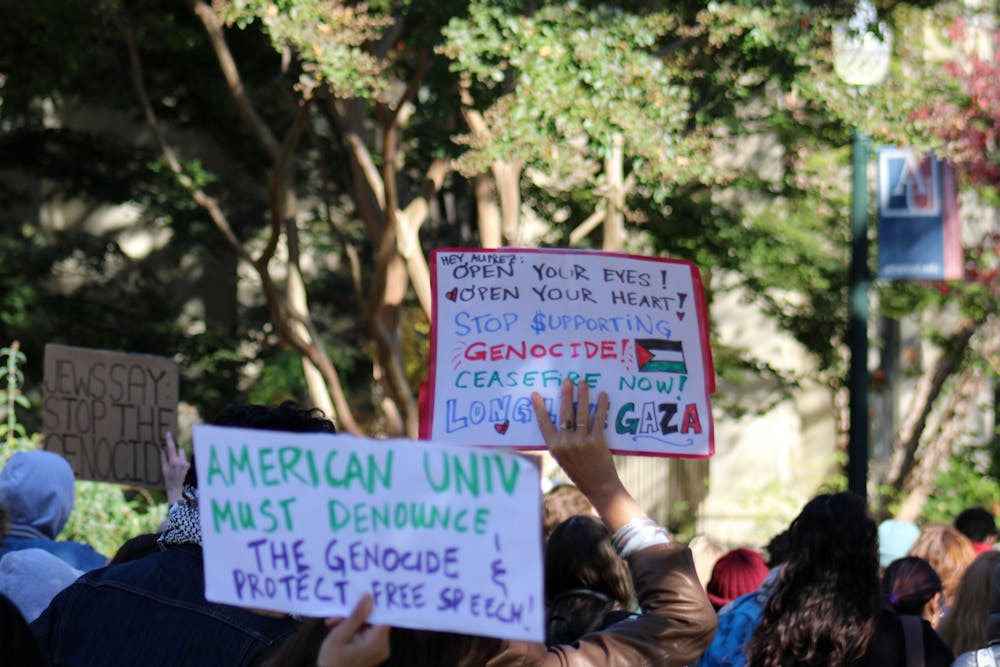Students gathered on the American University quad Nov. 1 to demand administrative support for Palestine and an end to the University’s funding of Israel.
The event was organized by the University chapter of Students for Justice in Palestine. Speeches from organizers condemned the reported 8,000 Palestinian civilian deaths that have ensued since the beginning of the current Israel-Hamas war and the University administration’s lack of response amid the rising death toll.
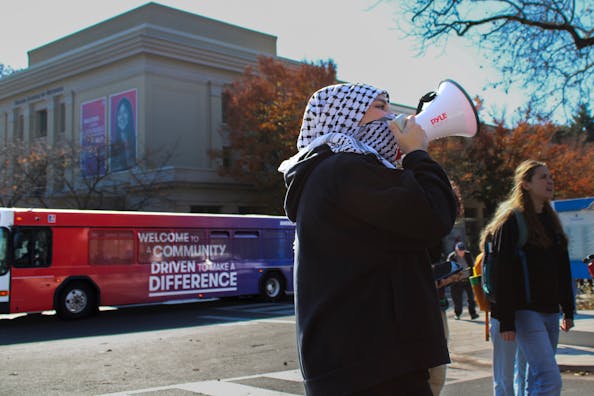
Speeches from SJP members asked how the University can expect students to go back to normal while their people “are facing genocide” and accused the University of supporting these civilian attacks.
Many of the speakers and attendees wore keffiyehs — traditional scarves that historically have symbolized Palestinian identity and resistance — or masks covering their faces. Many others chose not to speak to The Eagle on the record out of fear for their personal safety. Students across the United States have reportedly been doxxed, harassed and assaulted for expressing pro-Palestinian beliefs. Students at Harvard University were doxxed on four websites after signing a pro-Palestinian letter on campus.
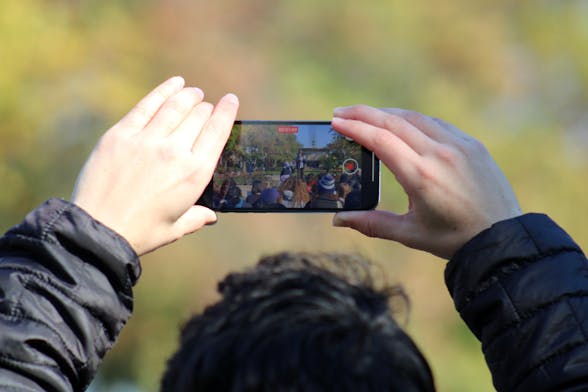
A member of Students for Change urged the University community to connect the situation in Gaza to their coursework, which they said often requires students to “learn and write about resisting colonialism, racism, sexism, classism, homophobia and many other ‘-isms’ that permeate our world.”
“Today, I implore you to connect the liberation of Palestine to your own words,” the speaker said to the crowd. “I ask you, how can you be radical if you only support decolonization in your writing and not in your practice?”
The protest marked the launch of a Jewish Voice for Peace chapter at AU. Jewish Voice for Peace, the largest Jewish anti-Zionist organization in the world, aims to “end United States support for Israel’s oppression of Palestinians,” according to its website.
Bryan Amador Rivera, a sophomore in the School of International Service, said that he attended the walkout after seeing a social media post advertising the event.
“I’m part of the [Latinos En Acción executive board], so we wanted to stand here for solidarity,” Amador Rivera said. “I know that this is an issue that’s affecting a lot of people on campus. And even though this is not affecting me directly, I still want to be there and support about what's going on.”
Amador Rivera added that because LEA is an organization that advocates for immigrants’ rights, he said he felt it was necessary to show up as an ally because “a lot of people are going to be displaced because of this issue.”
After the initial speeches on the quad, members of SJP led attendees on a march through campus, ending outside the President’s Office Building chanting, “Not another nickel, not another dime, no more money for Israel’s crimes.”
Once outside the building, SJP demanded for three actions from the University: stop erasure of Palestinian students and acknowledge the hurt that they’re feeling, cancel ties with weapons manufacturers that send weapons to Israel and release a statement “condemning the genocide in Palestine.”
Wesley Bush, who was appointed to the University’s Board of Trustees in January 2021, was the chairman and chief executive of Northrop Grumman, one of the world’s largest weapons manufacturers and military technology providers, until 2019. According to the American Friends Service Committee, Northrop Grumman manufactures multiple weapons systems used by the Israeli military.
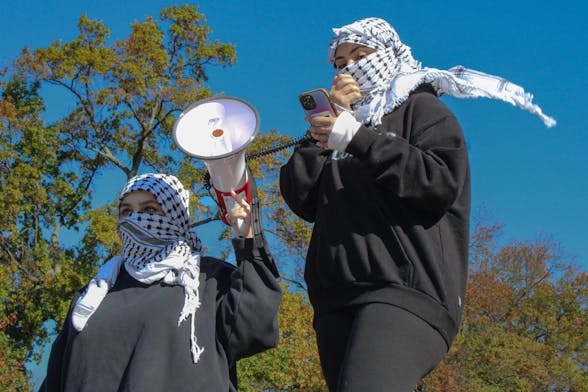
Protesters expressed disappointment in Burwell’s Oct. 12 email to the AU community addressing Hamas’ Oct. 7 attack on Israel.
“I felt like it was extremely disrespectful to say, ‘the Jewish community and beyond,’” Amador Rivera said of the email. “Just not acknowledging the Palestinians that are being affected by this, just saying ‘and beyond’ is not enough. … I felt like that was straight-up disrespectful and dismissive.”
Montague Chevallier, a junior in the School of Public Affairs, said he felt hopeless seeing so much violence against Palestinians in the news.
“I’m very surprised that there has been little support for the Palestinian students here,” Chevallier said. “It always feels like a disappointment … so I wish there was more show-up for the Palestinian students, especially as a Jewish student that feels like we always get the spotlight.”
He added that he understands that it is a “very scary” time for Jewish students on campus as well.
On the outskirts of the protest, College of Arts and Sciences junior Tomer Ben-Ezn — who is originally from Israel and is Jewish — said that while he thinks “what’s happening to Palestinians is horrible,” he disagreed with the demonstrators’ cause.
“Where do you want us to go?” he said. “Let’s say, ‘free Palestine from the river to the sea.’ Where do you want us to go?”
“From the river to the sea” is a political slogan associated with the fight for Palestinian liberation, according to the Palestine Liberation Organization. Geographically, it refers to the area between the Jordan River and the Mediterranean Sea, which includes the State of Israel and the Palestinian areas of the West Bank and Gaza Strip.
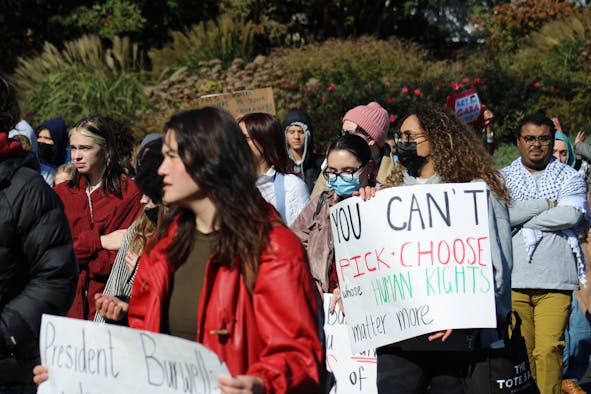
Faculty and staff joined students in the protest. Garrett Graddy-Lovelace, a professor in SIS, said she attended to support Palestinian students in this historical moment.
“There’s an outright genocide happening against the Gaza people,” Graddy-Lovelace said. “And the U.S. is supporting it financially and politically, and that in and of itself is appalling. And the fact that University leadership isn’t acknowledging that is troubling, to say the least.”
She added that AU administrators should show outward support for Arab, Muslim and specifically Palestinian students.
“In general, I defer to the students who just spoke right now at the rally, and they don’t feel supported,” Graddy-Lovelace said. “In fact, they feel attacked for their support and solidarity with Palestine in this critical moment.”
Armando Grundy-Gomes, a graduate student in SPA, stood on the sidelines as participating students marched to the SIS building.
“I’m here to support the Jewish people and the Palestinian people, but I’m mostly here to be supportive of not pursuing a one-sided narrative,” Grundy-Gomes said. “Nobody wants genocide. Nobody wants mass killing.”
He added that Hamas’ leaders call for the “eradication of Jews all over the world,” and said he disagreed with this “ethnic cleansing.”
Grundy-Gomes said he would like to see more dialogue rather than taking one side or another.
“I'm also not for the eradication of anybody, especially for the genocide of anybody,” he said. “I think that that's a false equivalence, but we should not be killing innocent Jews or innocent Palestinians. And I think we as a school need to elevate the conversation and have a dialogue especially [given that] we're stronger together.”
He said has no qualms about publicly voicing his opinion and encourages others to do the same.
“Be bold, be brave, be of good cheer,” Grundy-Gomes said. “Most importantly, we need to all lead together and we’re not going to lead this by turf-guarding. We need to come together; we need to be united. That’s what American University is about: being united.”
Editor’s Note: After the publication of this article, The Eagle removed the name of a speaker for Students for Change. The Eagle found that reporters and editors had not properly verified the speaker’s identity. An earlier version of this article also included only the last quote from Armando Grundy-Gomes. This quote without the context of his other quotes misconstrued his position. The article has since been updated with this context.
Correction: An earlier version of this article misspelled "SJP" as "SPJ" in one instance. The article has been updated with the correct spelling.
Izzy Fantini contributed reporting to this article.
This article was edited by Abigail Hatting, Jordan Young and Abigail Pritchard. Copy editing done by Isabelle Kravis.

